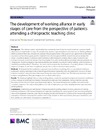| dc.contributor.author | Ivanova, Dima | |
| dc.contributor.author | Newell, Dave | |
| dc.contributor.author | Field, Jonathan | |
| dc.contributor.author | Bishop, Felicity L. | |
| dc.date.accessioned | 2024-03-26T15:08:45Z | |
| dc.date.available | 2024-03-26T15:08:45Z | |
| dc.date.issued | 2024-03-21 | |
| dc.identifier.citation | Ivanova, D., Newell, D., Field, J., & Bishop, F. L. (2024). The development of working alliance in early stages of care from the perspective of patients attending a chiropractic teaching clinic. Chiropractic & Manual Therapies, 32(1), 10. https://doi.org/10.1186/s12998-023-00527-8 | en |
| dc.identifier.issn | 2045-709X | |
| dc.identifier.uri | https://aecc.archive.knowledgearc.net/handle/123456789/281 | |
| dc.description | Available under License - Creative Commons Attribution: https://creativecommons.org/licenses/by/4.0/ | en |
| dc.description.abstract | Background: The clinician-patient relationship has consistently been found to predict treatment success in both physical and mental health settings. This relationship has been operationalised in the literature as "Working Alliance," which consists of three key components: patient-clinician agreement on the goals of care, agreement on the tasks required to achieve those goals, and the establishment of a strong bond. While research has demonstrated the impact of working alliance in physical health settings, it often measures working alliance early in patients' care journeys. However, no primary research has investigated how early working alliance develops between patients and chiropractors. Evidence suggests that musculoskeletal practitioners may require further training to feel confident in establishing working alliance. Therefore, this study aims to explore the development of working alliance in the early stages of chiropractic care from the patients' perspective to inform evidence-based practice.
Methods: Participants for this qualitative study were recruited from a teaching clinic at a specialised healthcare professions training university in the United Kingdom between September 2022 and April 2023. A total of 25 adult patients completed semi-structured interviews during the early stages of their care. The interview transcripts were analysed using Reflexive Thematic Analysis, from a critical realist stance.
Results: The findings highlight that an early working alliance entails the gradual development of patients' confidence in their decision to seek help from trainee chiropractors to alleviate their symptoms. The four themes describe the impact of the clinical context on patients' expectations, the trainee chiropractors' qualities that participants considered important for early working alliance, the role of explanations, and the interplay between pain and early working alliance.
Conclusions: Establishing an early trainee chiropractor-patient working alliance involves a process of building patients' confidence in the trainee chiropractors' expertise, identifying the correct goals of care, and recognising the value of the proposed treatment plan. Factors shaping this process include the context of the care journey, patients' perceptions of trainee chiropractors' qualities, their bodily sensations, their expectations, their past experiences, and their satisfaction with trainee chiropractors' explanations.
Keywords: Chiropractor-patient relationship; Confidence; Context; Expectations; Expertise; Explanations; Pain; Therapeutic Alliance; Trust; Working Alliance. | en |
| dc.language.iso | en | en |
| dc.publisher | Chiropractic & Manual Therapies | en |
| dc.subject | Working alliance | en |
| dc.subject | Therapeutic alliance | en |
| dc.subject | Chiropractor-patient relationship | en |
| dc.subject | Context | en |
| dc.subject | Expectations | en |
| dc.subject | Confidence | en |
| dc.subject | Expertise | en |
| dc.subject | Explanations | en |
| dc.subject | Pain | en |
| dc.subject | Trust | en |
| dc.title | The development of working alliance in early stages of care from the perspective of patients attending a chiropractic teaching clinic | en |
| dc.type | Article | en |
| dc.identifier.doi | https://doi.org/10.1186/s12998-023-00527-8 | |
